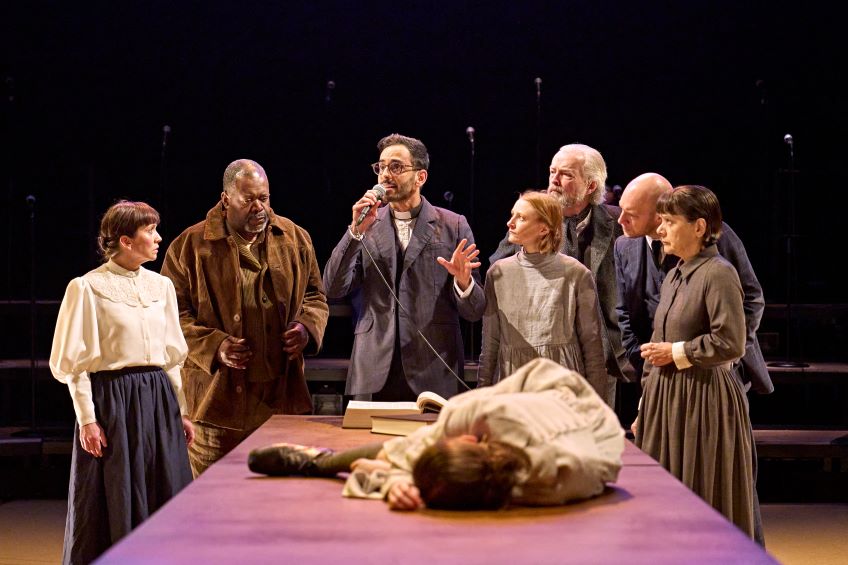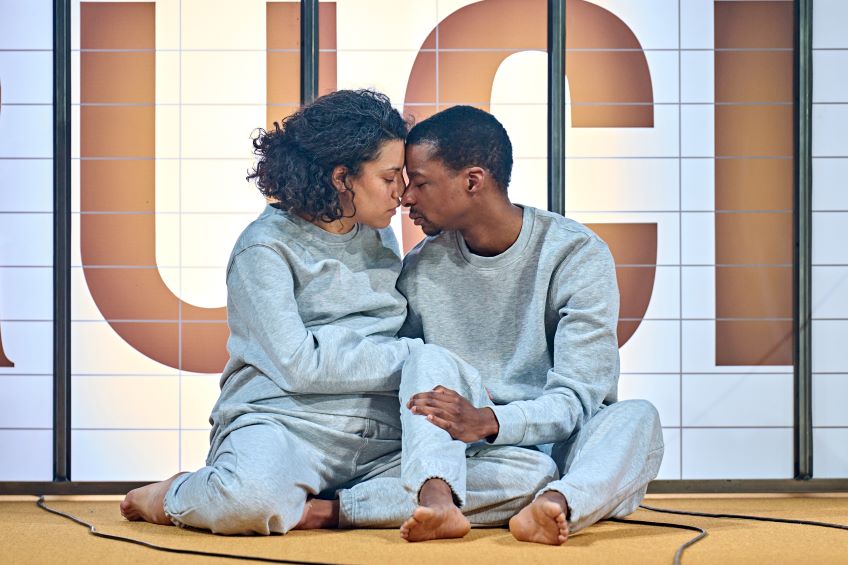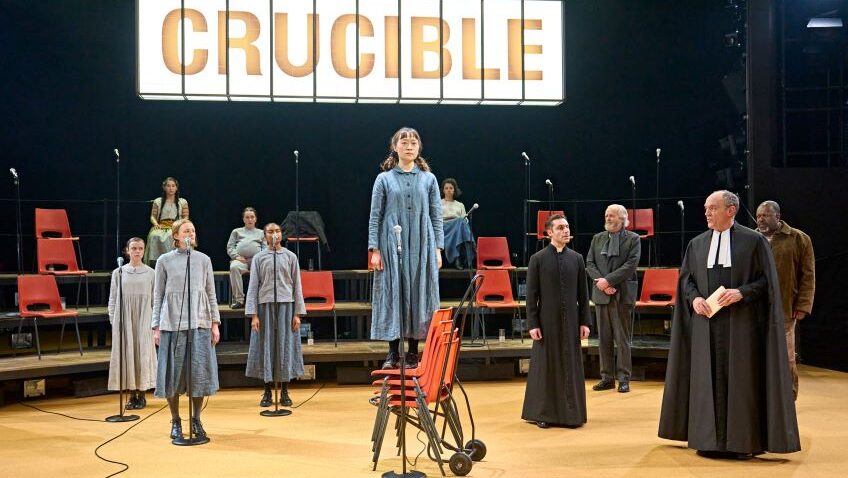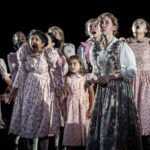Powerful emotional energy, stirring physical movement, compelling characters and super storytelling grip and thrill all the way in Anthony Lau’s production of The Crucible at the Crucible, which shines light beautifully upon a dark and terrible story, in which the milk of human kindness gets well and truly spilt.
First produced in 1953, The Crucible is ostensibly about the sensational frenzy of mass hysteria and paranoia that ripped through the little Puritan community of Salem, Massachusetts in 1692. It started with a few young girls daring to lark about, dancing and singing in the dark woods (still the scary preserve of “heathen” Native Americans.) In this strict, narrow, repressive, Bible-based society, where song, dance and book-reading were actual crimes, their behaviour was solid evidence of the work of the Devil.
As mass hysteria escalates and the voice of sense and reason is extinguished, wild accusations, denunciations, false confessions, skewed trials and unjust hangings take place left, right and centre. Arthur Miller’s play draws closely on well documented records of testaments, hearings and judgements of the time, slightly changing some characters.
With the play being written during the prolonged period of “witch-hunts” going on around him in his own time – the McCarthy witch-hunts of the late 1940s and into the 50s, the parallel was obvious. Mass hysteria and paranoia stemmed this time from an all-consuming fear of the spread of Communism and never-ending suspicions of “Reds under the beds.” Writers, actors, film directors (and Miller himself in 1956) were hauled in and interrogated, many losing work and reputation as a result. Endless other parallels have existed and still exist the world over, wherever frenzies of fear, tyranny, repression, distrust, suspicion, denunciations and unjust punishments get whipped up and lead to social breakdown, making the play’s relevance timeless.

In this production, dark, narrow claustrophobia still firmly occupies the mindsets of the characters but Georgia Lowe’s set is not confined to a joyless Puritan gloom of austere, seventeenth century, small-windowed rooms. Instead, broad, wide-ranging, animated movement stretches over, around and upwards across the entire stage, with lights and lighting changes lending great impact. Handsome, time-spanning costumes in unpatterned, subdued hues have subtle variety, as do the fine cast of 16 and their individual accents. Set and props are stark and minimal, more modern touches suggesting broader possibilities of time and place – as when, at intervals, portable electric lamps with long, black cables and tall, moveable microphone stands with detachable mics are moved about so characters might speak out to broadcast or shine the light on truth – or on lies. From time to time, fabulous singing voices create a most pleasing hum and harmony while subtle background notes add tension.
Three tiered platforms at the back form amphitheatre-style seats for characters to sit, silent and erect, when not performing, while neat, red, plastic chairs are added for the courtroom. The stark, wooden table that is first “possessed” young Betty’s bed is also a platform for actors to jump up, gain height and perform on, as is later, rehearsal-style, an ungainly stack of red chairs. Delivery and demeanour may be a bit less restrained and formal than historical accuracy might require in reflecting the strict life of relentless austerity and intolerance in a community ruled exclusively by hard toil and the word of the Bible, and laughs are played for once or twice, but the story and events come sturdily and chillingly to life, sustaining momentum.
Rose Shalloo is a striking Abigail Williams, instigator of the whole affair, a troubled child who revels in the ruthless cruelty of her soaring power as an all-out vindictive, destructive manipulator. Her presence onstage, silent and invisible, through later scenes as she prowls about, looking on at the chaos she’s wrought is powerfully creepy and sinister. Millicent Wong is magnificent, too, as Mary Warren, painfully weak and afraid but thrust by Abi’s bullying machinations into loud, hysterical frenzies of accusation in order to save her own skin.

As main man, John Proctor, Simon Manyonda is highly engaging, creating a relatable man in modern eyes who’s struggling desperately with emotions and conscience. Bewildered, exasperated, flawed, he’s ashamed of his former wild liaison with young Abigail but determined to sit ultimately on the side of right, retain his good name and tenderly support his wife Elizabeth, played warm and vulnerable by Anoushka Lucas. The Proctor’s bright farm, filled with endless flowers set in endless milk-churns, wheeled in on trollies, and with factory-style barn lit with strip-lights behind, turns hellish when flowers are strewn far and wide as, in rage and despair, Proctor throws them at Reverend Hale, the witchcraft expert. Sid Sagar makes a convincing Hale as he changes from an unquestioning, strict adherent to rulebooks to a caring man of reason and conscience in a play where human warmth sits side by side with cold cruelty.
Sargon Yalda’s Reverend Parris strikes home, too, neat and smooth in his priestly garb yet full only of impassioned, desperate self-interest. Mark Weinmand is cold and arrogant as opportunist land owner Thomas Putnam and Laura Pyper is his distraught, vengeful wife, incensed by the loss of seven babies. Geoffrey Aymer and Andrew Macbean earn sympathy as sincere, down-to-earth farmers Giles Corey and Francis Nurse, while Guillianna Martinez is a delightful Tituba, joyous with songs and stories of Barbados but full of alarm and bewilderment at the turn of events. Ian Drysdale’s Judge Danforth is all chilly, unreasonable, unlistening inflexiblity, while principled Rebecca Nurse, brave, unwavering champion of truth, is played stalwart and worthy by Alexandra Mathie.
Ensuring no-one forgets what play they’re at and where, a replica of the Crucible Theatre’s own illuminated sign hangs above the stage, lowering towards the end. Onstage beneath is the metaphorical crucible itself – a melting pot of humanity and human foibles, strengths and weaknesses, perfections and imperfections, in which brews a thick, murky broth of prejudice, narrow minds, deaf ears, hysteria, fear, paranoia, malice, personal grudges and rivalries, retaliation and revenge, greed and exploitation, self-interest, treachery, injustice, bravery and self-sacrifice. Welcome to our world.
Tension mounts as the crucible cauldron bubbles away in frantic attempts to separate lies from truth, and the fate of each individual is eventually sealed. Wonderfully compelling, wonderfully performed.
Eileen Caiger Gray
The Crucible runs until Sat 30 March.




